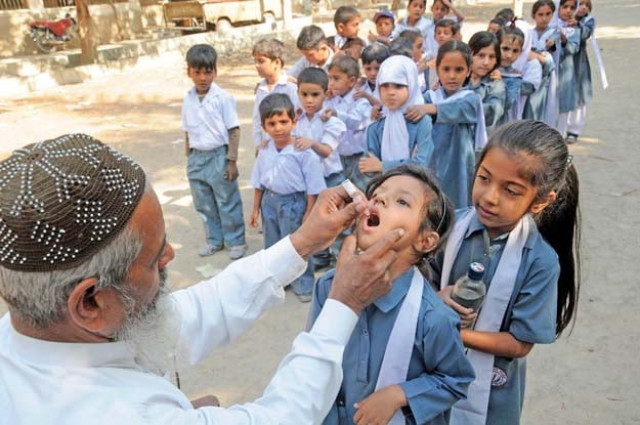Mission eradication: Polio strikes back in neglected Sindh
Health dept has focused on eliminating the virus in Karachi but has not done much in other parts of Sindh

A health worker administers the polio vaccine to schoolchildren in Karachi. PHOTO: FILE
The health department is stuck in a rather unusual situation. Since 2013, it has focused on eradicating polio from Karachi, the provincial capital, and had forgotten about the rest of the province.
They spent a large amount of money organising three to five-day door-to-door polio campaigns in the city, targeting high risk Union Councils such as Gadap, Baldia and Bin Qasim Town.
What they did not do was focus that same amount of energy, money and drive into the rest of the province. Due to this, this year we have seen a different trend in reported polio cases. Last year there were 30 polio cases reported from Sindh — 26 in Karachi and four in the rest of the province. Since the beginning of 2015, four polio cases have been reported from Sindh — none from Karachi but two from Dadu and one each from Qambar-Shahdadkot and Sukkur.
The first case was reported back in January — Sonia, daughter of Dhani Bux, a resident of Qambar. The second case was Saddam Hussain, son of Rano Khan, from Dadu. The third was Uzair Hussain from Sukkur. The latest confirmed case is of a girl named Rubina from Dadu.
The vaccination
It is still not clear why or how Saddam, 10, caught the polio virus. There is a contradiction in what health officials and his parents claim about his vaccinations. According to records shared by the district health officials, the child was given at least 10 doses of the anti-polio vaccine. Health Secretary Iftikhar Shalwani, however, claims the child was administered seven doses.
His parents on the other hand said that their child was never given any polio drops. "No one ever came to our village to vaccinate the children," said Saddam's father Rano Khan. "Our son was healthy and doing well till February 10. Then he spiked a fever and within five days the doctors told us that he might have polio."
While talking to The Express Tribune, Rano Khan said that he had four sisters and four brothers who lived in the area. His child does not go to school or interact with any children outside the village. "I have never taken my child outside the village," said the father. "He has not been to any town or city where someone had polio. I do not know how he got it."
Saddam's father is a farmer and lives in the village of Thallo which is located around six kilometres from Dadu city. He claimed that no polio team had visited their village since before the birth of his son. "All children, even those over the age of five were vaccinated after Saddam's case," said Rano Khan while explaining that both of Saddam's legs were now paralyzed. "Health officials visited us but so far no one has advised us on what treatment we should go for."
Shalwani suspects Saddam's case may be among those they were unable to reach or 'missing'. He said that it was possible the child contracted the virus because the cold chain could not be maintained. He added that they were carrying out an investigation to find out what happened.
"Children in rural Sindh have not been given due attention because of the focus on the micro-plan," he said. "We will launch a new strategy which will cover all of Sindh. We will not wait for parents to bring their children to vaccination centres." He added that polio workers will go administer drops to children in rural areas by going door-to-door.
The next step
"The virus can also affect even an adult," said Sindh's head for the Extended Programme on Immunisation (EPI), Dr Mazhar Khamisani. "We had a case of a 27-year-old man with polio in Punjab a few years ago."
The EPI's records show that a 13-year-old boy from Ghotki tested positive for polio in 2010. The records also indicate that environmental samples taken from different parts of the province suggest that the wild polio strain is present in the area. Some officials suspect that more cases will emerge from Hyderabad and Matiari. "Our focus has been on Karachi," said the former deputy programme manager of the EPI, Dr Durre Naz Jamal. "No one took the rural areas seriously. There was no monitoring." Dr Jamal believes that more polio cases may surface in the province soon if 90 per cent of Sindh's children are not vaccinated.
Published in The Express Tribune, March 16th, 2015.



















COMMENTS
Comments are moderated and generally will be posted if they are on-topic and not abusive.
For more information, please see our Comments FAQ